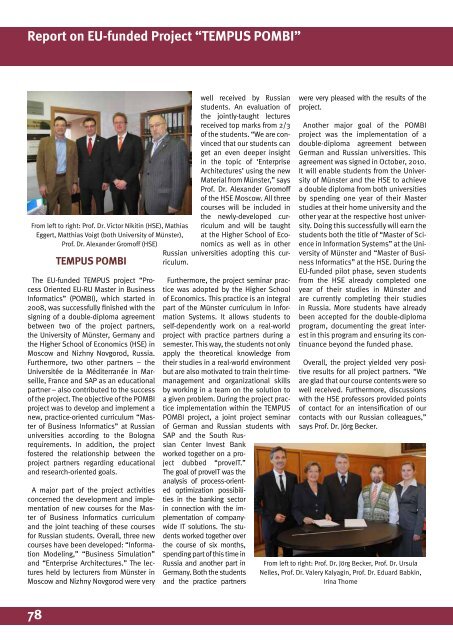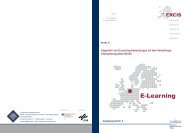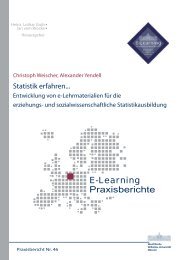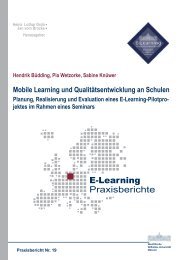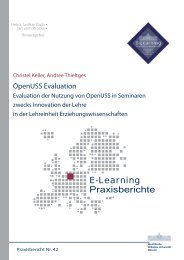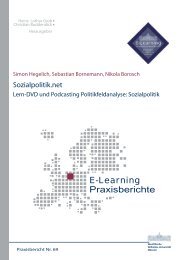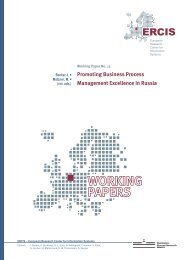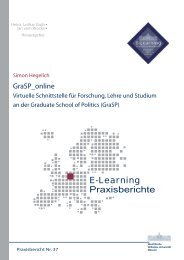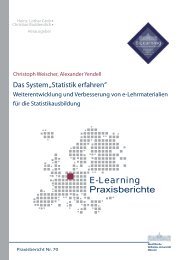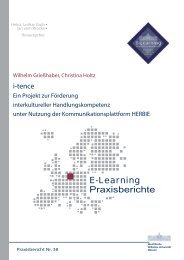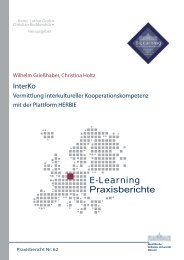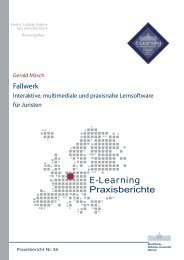2010 - ERCIS
2010 - ERCIS
2010 - ERCIS
You also want an ePaper? Increase the reach of your titles
YUMPU automatically turns print PDFs into web optimized ePapers that Google loves.
Report on EU-funded Project “TEMPUS POMBI”<br />
well received by Russian<br />
students. An evaluation of<br />
the jointly-taught lectures<br />
received top marks from 2/3<br />
of the students. “We are convinced<br />
that our students can<br />
get an even deeper insight<br />
in the topic of ‘Enterprise<br />
Architectures’ using the new<br />
Material from Münster,” says<br />
Prof. Dr. Alexander Gromoff<br />
of the HSE Moscow. All three<br />
courses will be included in<br />
the newly-developed cur-<br />
From left to right: Prof. Dr. Victor Nikitin (HSE), Mathias riculum and will be taught<br />
Eggert, Matthias Voigt (both University of Münster), at the Higher School of Eco-<br />
Prof. Dr. Alexander Gromoff (HSE)<br />
nomics as well as in other<br />
Russian universities adopting this curriculum.<br />
78<br />
TEMPUS POMBI<br />
The EU-funded TEMPUS project “Process<br />
Oriented EU-RU Master in Business<br />
Informatics” (POMBI), which started in<br />
2008, was successfully finished with the<br />
signing of a double-diploma agreement<br />
between two of the project partners,<br />
the University of Münster, Germany and<br />
the Higher School of Economics (HSE) in<br />
Moscow and Nizhny Novgorod, Russia.<br />
Furthermore, two other partners – the<br />
Universitée de la Méditerranée in Marseille,<br />
France and SAP as an educational<br />
partner – also contributed to the success<br />
of the project. The objective of the POMBI<br />
project was to develop and implement a<br />
new, practice-oriented curriculum “Master<br />
of Business Informatics” at Russian<br />
universities according to the Bologna<br />
requirements. In addition, the project<br />
fostered the relationship between the<br />
project partners regarding educational<br />
and research-oriented goals.<br />
A major part of the project activities<br />
concerned the development and implementation<br />
of new courses for the Master<br />
of Business Informatics curriculum<br />
and the joint teaching of these courses<br />
for Russian students. Overall, three new<br />
courses have been developed: “Information<br />
Modeling,” “Business Simulation”<br />
and “Enterprise Architectures.” The lectures<br />
held by lecturers from Münster in<br />
Moscow and Nizhny Novgorod were very<br />
Furthermore, the project seminar practice<br />
was adopted by the Higher School<br />
of Economics. This practice is an integral<br />
part of the Münster curriculum in Information<br />
Systems. It allows students to<br />
self-dependently work on a real-world<br />
project with practice partners during a<br />
semester. This way, the students not only<br />
apply the theoretical knowledge from<br />
their studies in a real-world environment<br />
but are also motivated to train their timemanagement<br />
and organizational skills<br />
by working in a team on the solution to<br />
a given problem. During the project practice<br />
implementation within the TEMPUS<br />
POMBI project, a joint project seminar<br />
of German and Russian students with<br />
SAP and the South Russian<br />
Center Invest Bank<br />
worked together on a project<br />
dubbed “proveIT.”<br />
The goal of proveIT was the<br />
analysis of process-oriented<br />
optimization possibilities<br />
in the banking sector<br />
in connection with the implementation<br />
of companywide<br />
IT solutions. The students<br />
worked together over<br />
the course of six months,<br />
spending part of this time in<br />
Russia and another part in<br />
Germany. Both the students<br />
and the practice partners<br />
were very pleased with the results of the<br />
project.<br />
Another major goal of the POMBI<br />
project was the implementation of a<br />
double-diploma agreement between<br />
German and Russian universities. This<br />
agreement was signed in October, <strong>2010</strong>.<br />
It will enable students from the University<br />
of Münster and the HSE to achieve<br />
a double diploma from both universities<br />
by spending one year of their Master<br />
studies at their home university and the<br />
other year at the respective host university.<br />
Doing this successfully will earn the<br />
students both the title of “Master of Science<br />
in Information Systems” at the University<br />
of Münster and “Master of Business<br />
Informatics” at the HSE. During the<br />
EU-funded pilot phase, seven students<br />
from the HSE already completed one<br />
year of their studies in Münster and<br />
are currently completing their studies<br />
in Russia. More students have already<br />
been accepted for the double-diploma<br />
program, documenting the great interest<br />
in this program and ensuring its continuance<br />
beyond the funded phase.<br />
Overall, the project yielded very positive<br />
results for all project partners. “We<br />
are glad that our course contents were so<br />
well received. Furthermore, discussions<br />
with the HSE professors provided points<br />
of contact for an intensification of our<br />
contacts with our Russian colleagues,”<br />
says Prof. Dr. Jörg Becker.<br />
From left to right: Prof. Dr. Jörg Becker, Prof. Dr. Ursula<br />
Nelles, Prof. Dr. Valery Kalyagin, Prof. Dr. Eduard Babkin,<br />
Irina Thome


